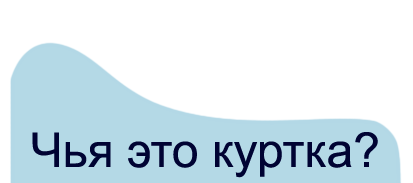Немно́го о языке́ 1.10 Моби́льный телефо́н
Question words and intonation
Over the course of this unit you have seen a number of question words. How well do you remember their meanings? Mouse over the words below to check.
- кто?
- что?
- где?
- как?
- како́й?
- чей?
But wait a minute! Doesn’t Как тебя́ зову́т? mean ‘What’s your name?’?
Careful! Remember that the зову́т construction literally means, “How do they call you?”
Word order and intonation with question words
Question words will generally come at the start of the sentence in neutral Russian word order.
Listen to the intonation of these questions:
| Кто там? | Где буфе́т? |
| Где туале́т? | Кто э́то? |
| Чья э́то ку́ртка? | Что э́то? |
Note that the question word receives a heavier emphasis than we would use in English, and the word is only slightly higher than midrange pitch. After the question word, your pitch should lower to midrange, and then at the end of the question fall lower still. So a drawing of the “shape” of the Russian sentence might look like this:
 |
| Чья э́то ку́ртка? |
The English and Russian intonational patterns for question-word questions are very different. When students who are native speakers of English first encounter the Russian intonational pattern, they sometimes feel -- perhaps because of the heavy emphasis -- that it sounds rude, abrupt or even “angry” -- try not to “give in” to that sort of thinking. This intonation is absolutely neutral in Russian! It does not indicate any sort of impatience, irritation or anger.
Now work on producing the intonation yourself. Listen to the questions below and repeat them, trying to place your emphasis on the question word, and keeping your pitch from rising at the end of the question.
| Кто э́то? | Что там? |
| Что э́то тако́е? | Како́й твой телефо́н? |
| Чей э́то чемода́н? | Где на́ши студе́нты? |
